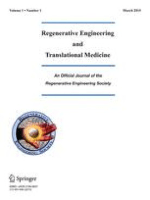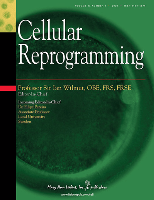
CYTOTHERAPY
Scope & Guideline
Unveiling the Next Generation of Regenerative Science.
Introduction
Aims and Scopes
- Cell Therapy Mechanisms and Applications:
Research explores the biological mechanisms by which various cell types, especially stem cells and immune cells, exert therapeutic effects in different clinical conditions, such as cancer, autoimmune diseases, and degenerative disorders. - Manufacturing and Quality Control:
The journal emphasizes the development of robust manufacturing processes for cell-based therapies, including adherence to Good Manufacturing Practices (GMP), quality control measures, and the implementation of automated systems to enhance scalability and reproducibility. - Clinical Trials and Translational Research:
Cytotherapy features studies that bridge the gap between laboratory research and clinical application, reporting on the safety, efficacy, and long-term outcomes of cell therapies in diverse patient populations. - Innovative Technologies and Methodologies:
The journal highlights advancements in technologies for cell engineering, including CRISPR/Cas9 gene editing, microfluidics, and novel bioreactor designs, which contribute to improved therapeutic products. - Extracellular Vesicles and Secretome Research:
There is a significant focus on the role of extracellular vesicles derived from stem cells in mediating therapeutic effects, including their immunomodulatory properties and potential in regenerative medicine. - Regulatory and Ethical Considerations:
Research addresses the regulatory frameworks and ethical considerations surrounding the development and use of cell therapies, ensuring compliance and patient safety.
Trending and Emerging
- Engineered Cell Therapies:
There is a significant increase in research focused on engineered cell therapies, particularly the development of CAR-T and other genetically modified immune cells, reflecting the growing interest in precision medicine and targeted therapies. - Extracellular Vesicles as Therapeutics:
Research exploring the therapeutic potential of extracellular vesicles derived from stem cells has surged, emphasizing their role in mediating immunomodulatory effects and tissue regeneration. - Automation and Robotics in Manufacturing:
The incorporation of automation and robotics into cell therapy manufacturing processes is a rapidly emerging trend, aimed at enhancing efficiency, consistency, and scalability in production. - Personalized Medicine Approaches:
Emerging themes around personalized medicine, including the use of patient-derived cells for tailored therapies, are gaining traction, as they promise improved outcomes and reduced adverse effects. - Regulatory Science and Guidelines:
There is a growing focus on regulatory science, addressing the complexities of bringing cell therapies to market and ensuring compliance with evolving regulatory frameworks. - Microfluidics and Novel Bioreactor Systems:
Research into microfluidic technologies and advanced bioreactor systems is trending, driven by the need for scalable and efficient production methods for cell therapies.
Declining or Waning
- Traditional Stem Cell Therapies:
There has been a noticeable decline in publications focused solely on traditional stem cell therapies without innovative modifications or applications, as the field shifts towards more advanced and engineered solutions. - Basic Biological Studies:
Research that primarily delves into the fundamental biology of stem cells without direct therapeutic implications appears to be waning, as there is a greater emphasis on translational research and clinical applications. - Single-Cell Analysis Techniques:
Although single-cell technologies were once a hot topic, the frequency of papers solely dedicated to basic single-cell analysis techniques has decreased, possibly due to the rapid evolution of more integrated and application-focused methodologies. - Animal Models of Disease:
The journal has seen less emphasis on animal model studies that do not directly translate to human applications, as researchers increasingly prioritize studies that have immediate clinical relevance.
Similar Journals

STEM CELLS AND DEVELOPMENT
Fostering Collaboration in Cutting-edge ResearchSTEM CELLS AND DEVELOPMENT, published by Mary Ann Liebert, Inc., is a leading peer-reviewed journal dedicated to the rapidly advancing fields of stem cell biology and developmental science. With an ISSN of 1547-3287 and an E-ISSN of 1557-8534, the journal encompasses a broad range of topics central to understanding stem cells' roles in development and regeneration processes. It holds a prestigious standing within its category quartiles, ranking Q3 in Cell Biology, Q2 in Developmental Biology, and Q2 in Hematology for 2023. With its convergence from 2004 to 2024, STEM CELLS AND DEVELOPMENT fosters an innovative platform for researchers, professionals, and students to disseminate groundbreaking research, share insights, and explore novel therapeutic approaches. Open access options enhance the journal's visibility and accessibility, promoting a collaborative exchange of information among the scientific community. Positioned at the forefront of stem cell research and its applications, this journal is vital for anyone seeking to stay informed about the latest advancements and trends within these critical areas of study.

Cell Journal
Transforming Knowledge into Breakthroughs in Cell BiologyCell Journal is a leading interdisciplinary publication in the fields of Cell Biology, Developmental Biology, Molecular Biology, and Reproductive Medicine, published by ROYAN INST since its inception as an open-access journal in 2007. With an ISSN of 2228-5806 for print and 2228-5814 for electronic editions, it provides a vital platform for researchers and professionals to disseminate innovative findings and insights that shape our understanding of cellular processes and reproductive sciences. The journal boasts an impressive Scopus ranking, achieving a Q3 position in both Molecular Biology and Reproductive Medicine, highlighting its significance in the academic community. Situated in Tehran, Iran, Cell Journal encourages global collaboration through its accessible content, making cutting-edge research available to a diverse audience. As it converges from 2011 to 2024, the journal continues to emphasize the importance of thorough scientific inquiry, fostering advancements that drive both theoretical frameworks and practical applications in cell science.

Molecular Therapy Methods & Clinical Development
Driving innovation in molecular therapy methods.Molecular Therapy Methods & Clinical Development, published by CELL PRESS, is a premier Open Access journal dedicated to advancing the field of gene and cell therapy through innovative methodologies and clinical developments. Since its inception in 2014, the journal has garnered significant attention within the research community, achieving impressive Q1 quartile rankings in Genetics, Molecular Biology, and Molecular Medicine as of 2023. With a commendable Scopus ranking that positions it within the top echelons of its categories, this journal serves as an essential platform for researchers, professionals, and students alike, providing access to cutting-edge research that drives the future of therapeutic approaches. With its commitment to Open Access, readers worldwide can easily access high-quality and impactful content that fosters collaboration and knowledge-sharing in this rapidly evolving domain. The journal’s scope encompasses crucial advancements in therapeutic methodologies, ensuring that it remains at the forefront of scientific discourse and innovation.

Regenerative Engineering and Translational Medicine
Transforming Research into Real-World SolutionsRegenerative Engineering and Translational Medicine is an esteemed academic journal published by Springer Heidelberg, focusing on the interdisciplinary fields of biomaterials, biomedical engineering, and cell biology. With an ISSN of 2364-4133 and an E-ISSN of 2364-4141, the journal has carved a niche for itself since its inception in 2015, showcasing cutting-edge research that bridges the gap between scientific findings and practical applications in regenerative medicine. As a recognized platform in its field, it is currently positioned within Q3 quartiles in biomaterials, biomedical engineering, and medicine (miscellaneous), with a Scopus ranking that reflects its growing influence among peers. The journal aims to disseminate high-quality, peer-reviewed articles that highlight advancements in regenerative engineering, further advancing both theoretical and applied research. Scholars and practitioners seeking to stay at the forefront of the ever-evolving landscape of regenerative health solutions will find invaluable insights and innovations within these pages. Join a community of leading thinkers and explore the journal's comprehensive research contributions, which are crucial for fostering partnerships between academia and industry in the quest for transformative medical solutions.

CYTOTECHNOLOGY
Transforming Knowledge: Your Gateway to Cutting-Edge Cytotechnological Research.CYTOTECHNOLOGY, an esteemed journal published by Springer, stands as a vital resource in the fields of Bioengineering, Biomedical Engineering, and Biotechnology. With an impact factor reflective of its solid position within academia, this journal encompasses a broad scope dedicated to the advancement of cytotechnological research and applications from its inception in 1987 through to its latest volumes in 2024. Based in the Netherlands, it is committed to providing researchers, professionals, and students with high-quality, peer-reviewed articles that contribute to the understanding and innovations in cytotechnology. Although currently not open access, CYTOTECHNOLOGY has garnered a commendable reputation, holding Q3 rankings in multiple categories, indicating its relevance and influence within the scientific community. Researchers are encouraged to submit their cutting-edge findings to share insights that can spark further advancements in this dynamic field.

Stem Cell Research
Exploring the potential of regenerative medicine.Stem Cell Research is a premier Open Access journal published by ELSEVIER, dedicated to advancing the understanding of stem cell biology. Since its inception in 2007, the journal has provided a platform for the latest research in the fields of Cell Biology, Developmental Biology, and Medicine, with its publication being accessible globally since 2014. Located in the Netherlands, the journal’s comprehensive scope aims to bridge fundamental discoveries with clinical applications, fostering collaboration among researchers and professionals. With a 2023 impact factor reflected in its Q4 ranking in Cell and Developmental Biology and a commendable position in the 64th percentile for General Medicine, Stem Cell Research remains a vital resource for those interested in the dynamic landscape of regenerative medicine. Targeting an audience that includes researchers, practitioners, and students, the journal emphasizes not only the significance of stem cells in medical science but also the ethical considerations and the public discourse surrounding stem cell research. Join the community committed to pioneering the future of stem cell science through rigorous peer-reviewed research.

Cellular Reprogramming
Unlocking the Potential of Cellular ReprogrammingCellular Reprogramming is a prominent academic journal published by MARY ANN LIEBERT, INC, dedicated to advancing the field of cellular biology and biotechnology. With its ISSN 2152-4971 and E-ISSN 2152-4998, this journal provides an innovative platform for researchers and professionals to share groundbreaking research findings on cellular reprogramming, stem cell biology, and regenerative medicine. Established in 2010, and actively publishing until 2024, the journal is recognized for its contributions, evidenced by its categorizations in the Q3 and Q4 quartiles across several related fields, including biotechnology and developmental biology. This peer-reviewed journal not only supports open access to scientific literature but also aims to enhance interdisciplinary collaboration among scientists. With a growing impact in the realms of biochemistry, genetics, and molecular biology, Cellular Reprogramming remains an essential resource for the dissemination of pioneering research that could shape the future of cellular therapies.

IN VITRO CELLULAR & DEVELOPMENTAL BIOLOGY-ANIMAL
Illuminating the Path of In Vitro StudiesIN VITRO CELLULAR & DEVELOPMENTAL BIOLOGY-ANIMAL, published by SPRINGER, is a pivotal journal in the fields of cell biology and developmental biology, focusing on in vitro studies that enhance our understanding of animal cellular mechanisms and development. With an ISSN of 1071-2690 and an E-ISSN of 1543-706X, this esteemed journal offers a platform for researchers to present their findings and contribute to the body of knowledge necessary for advancements in biological sciences. As a recognized publication, it holds a 2023 category quartile of Q4 in Cell Biology and Developmental Biology, and Q3 in miscellaneous Medicine, reflecting its competitive position yet inviting critical submissions that can span multidisciplinary approaches. Though currently not open access, it serves as an essential resource for professionals, researchers, and students dedicated to unraveling the complexities of cellular processes in an ever-evolving field. The journal has been continuously published since 1986, signifying its long-standing commitment to fostering scientific discourse and innovation.

BIOCELL
Pioneering Discoveries in Molecular BiologyBIOCELL is a distinguished peer-reviewed journal dedicated to the field of Cell Biology, published by TECH SCIENCE PRESS. Since its inception in 1995, the journal has been at the forefront of disseminating innovative research, with converged publication years extending from 1995 to 2013 and from 2015 to 2024. Although it currently holds a Q4 ranking in the Cell Biology category according to the 2023 category quartiles, BIOCELL aims to foster advancements by providing a platform for researchers, professionals, and students to share their findings in biochemistry, genetics, and molecular biology. The journal is available in both print (ISSN: 0327-9545) and digital formats (E-ISSN: 1667-5746) and seeks to attract contributions that enhance scholarly dialogue and understandings of cellular mechanisms and innovations. With a commitment to quality research and critical discourse, BIOCELL plays an important role in nurturing the scientific community within Argentina and beyond, offering vital insights that contribute to the advancement of the life sciences.

EXPERIMENTAL CELL RESEARCH
Shaping the Future of Cell ScienceEXPERIMENTAL CELL RESEARCH is a highly respected journal published by Elsevier Inc, specializing in the dynamic and ever-evolving field of Cell Biology. With an impact factor positioned in the Q2 quartile for 2023, it ranks at the 124th position out of 285 in the Scopus Ranks, indicating a solid reputation among peers in the domains of biochemistry, genetics, and molecular biology. Since its inception in 1950, the journal has contributed significantly to the dissemination of groundbreaking research, providing a platform for studies that explore the nuances of cellular mechanisms, processes, and experimental methodologies. Although the journal currently does not offer open access, its commitment to high-quality, peer-reviewed research continues to attract submissions from leading scientists and scholars across the globe. Researchers, professionals, and students alike will find this journal an invaluable resource for keeping abreast of current developments and innovative breakthroughs in cellular science.